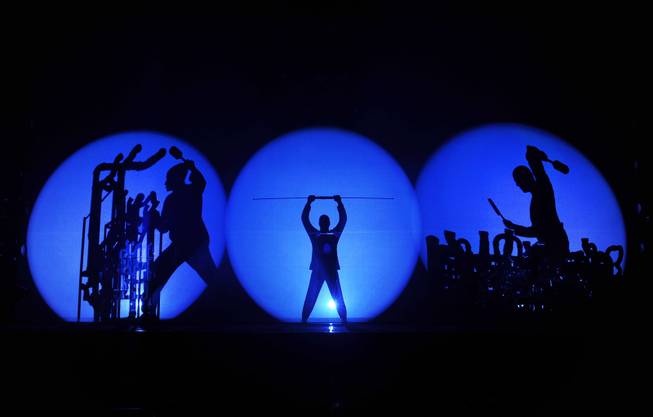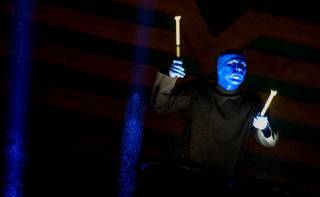
Denise Truscello
Blue Man Group performs at the Monte Carlo October 21, 2013.
Thursday, July 6, 2017 | 11 a.m.
For almost 30 years, Blue Man Group has pervaded pop culture around the world with its eclectic, nonverbal percussive performances, zany lights and comedic movements. (OK, fine. Dancing.) And of course, there is the blue body paint from head to toe.
Now, the Blue Men are joining the circus.
Cirque du Soleil, the global performance juggernaut best known for its acrobatic circus displays, on Thursday announced that it had acquired Blue Man Productions, with the mutual aim of expanding Blue Man’s reach beyond its five permanent United States shows (in New York, Boston, Chicago, Las Vegas and Orlando, Florida), a world tour and one permanent international show (Berlin).
After the acquisition, Blue Man will be able to tap into Cirque’s worldwide access to theaters and marketers. In particular, both organizations have their eye on China, home to one of the most powerful and quickly growing entertainment industries in the world.
“We saw the potential for a marketing and distributing powerhouse like Cirque du Soleil to be able to distribute Blue Man Group and make their brand better known internationally,” said Daniel Lamarre, Cirque’s chief executive, in an interview. Cirque currently has 18 live shows worldwide.
The purchase provided an opportunity for Cirque to diversify its portfolio after years of financial tumult. In 2015, the company sold a majority stake to TPG, a private equity firm in Texas.
“The acquisition of Blue Man, for us, is kind of a breakthrough to make clear to people that Cirque is going from a circus company to becoming a global leader of entertainment,” Lamarre said.
The terms of the deal were not disclosed, although Lamarre said the sale price was in the “tens of millions.”
Chris Wink, who founded Blue Man Group in 1991 along with Phil Stanton and Matt Goldman, said that the idea to sell came about a few years ago, as the company was looking to gain a foothold in other parts of the world. China specifically came to mind.
“We started to feel like we needed some help, plus we had some creative ideas that were beyond our own means,” Wink said in a phone interview. “We thought of some ways that the Blue Men and their performances could go on a bigger scale.”
It just so happened that for a company looking to find a permanent home in an entertainment pillar like China (and other large markets), Cirque was a fit. Along with TPG, the Chinese investment firm Fosun owns a minority stake in Cirque, and Lamarre said the circus was trying to make heavy inroads into China.
Lamarre said that next week he was headed to China to announce a seven-city Cirque tour that is to start in October.
Conceptually, China is an ideal destination for Blue Man Group. One of the biggest challenges facing U.S. productions in China is the language barrier, an obstacle that doesn’t exist for Blue Man’s mostly nonverbal shows.
“I think that to unlock the larger audience in China, it either needs to be in Chinese or nonverbal,” said Marc Routh, the president of Broadway Asia, a company that produces and distributes tours throughout Asia. “Blue Man is certainly one of the greatest entrees into that nonverbal market.”
Routh also said that the demand for theater in China and other areas of Asia is growing. Over the last several years, Mandarin-language versions of popular Broadway productions have been visible in China, including “Into the Woods” and “Mamma Mia!” In 2014, China announced plans to build a $320 million musical production center near Beijing. In addition, several theaters have been built around the country in the last decade, according to Routh, referring to them as “mini-Lincoln Centers.”
“It’s been an explosion,” Routh said.
During the process of finding a prospective partner — “The idea of letting go of the reins is not an easy one,” Wink said — Cirque seemed like a match for other reasons. Wink said there was mutual admiration, even though the companies were in some ways competing over the same off-the-wall creative turf. Lamarre, in a separate interview, agreed.
“Those guys have been able to develop the type of show that is very unique,” Lamarre said. “A little bit like Cirque.”
Blue Man Group was founded in the 1980s as a sort of response to and rejection of performance and cultural norms. Cirque du Soleil’s founder, Guy Laliberté, was a fire-eater before creating Cirque in 1984, a show that sprang from cultivating street performers near Quebec. Both companies feature shows that have been traditionally nonverbal.
After initially starting with 20 performers, Cirque says it has expanded to almost 4,000 employees (including 1,300 performers from roughly 50 countries) and brings in roughly $1 billion in revenue yearly. Its shows are as varied as they are typically well attended, with 13 million patrons annually. (It has had its flops over the years, including the calamitous 2010 run of “Banana Shpeel,” at the Beacon Theater, and “Zarkana,” which forgettably ran at Radio City Music Hall in 2011 and 2012.)
Blue Man Group has achieved a level of pop-culture success that would have been unthinkable in the 1980s. It reportedly brings in hundreds of millions of dollars a year, although a spokeswoman declined to confirm that number.
The group was the subject of a long-running and still oft-quoted story line in the sitcom “Arrested Development,” along with being referred to in countless other movies and shows. It starred in commercials for Intel, has been nominated for a Grammy and has even founded a private school in New York City called the Blue School.
However, Blue Man Group has had its own problems. In 2016, a musical collaborator since the group’s inception, Ian Pai, sued Blue Man for $150 million, contending that he had been underpaid for decades. A trial is set to begin next April.
There have been no discussions about combining Cirque and Blue Man onstage, nor has either side expressed hope for such a collaboration.
“The Blue Man Group will keep its autonomy,” Lamarre said. “We’re not going to mix the Cirque du Soleil brand with the brand of Blue Man Group.”
And as far as the Blue Man team is concerned, its shows won’t lose any of the screwball charm that has attracted more than 35 million viewers since the troupe’s founding.
When Wink was asked what would change about Blue Man Group going forward, he was frank: “Hopefully, very little.”


Join the Discussion:
Check this out for a full explanation of our conversion to the LiveFyre commenting system and instructions on how to sign up for an account.
Full comments policy